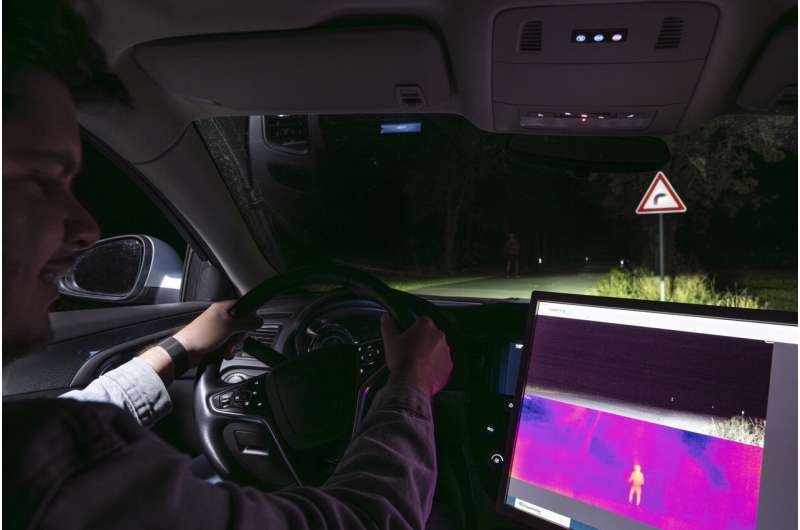
The camera in action: Despite the headlights, the pedestrian at the side of the road is barely visible. Only the thermal imaging camera makes him clearly visible.Credit: Fraunhofer IOF
Fall is here, bringing rain, fog, and early darkness. For road users, this means heightened caution, as visibility conditions increasingly deteriorate. Thermal imaging cameras that can reliably detect people even in poor or limited visibility conditions can ensure greater safety here. This is particularly true for autonomous vehicles where there may not be a human constantly observing the road ahead.
A team from Fraunhofer IOF has therefore set themselves the goal to develop a thermal imaging camera for road traffic applications. The result is a novel infrared camera that operates in the wavelength range of 8 to 14 micrometers—precisely the same range in which thermal radiation emitted by humans is found, both day and night. Additionally, the researchers have succeeded in realizing this technology in a particularly cost-effective yet powerful manner.
"This technology can significantly improve road safety and prevent accidents," explains project manager Martin Hubold from Fraunhofer IOF. "This is achieved by supplementing conventional camera systems and sensors, e.g. LIDAR or RADAR, under challenging visibility conditions without requiring active illumination."
Flat design with fast optics and high angular resolution
When creating the innovative infrared camera, the researchers were guided by their experience with multi-aperture cameras. "The core idea is to build the camera from several small and cost-effective uncooled bolometer arrays," says Hubold. The individual image segments are combined by software into a large overall image with a current resolution of approximately 530 x 210 pixels over a field of view of 34 x 13 degrees.

For comparison: The entire catadioptric optics take up only a fraction of a standard housing (shown here in gray) for conventional infrared cameras.Credit: Fraunhofer IOF
The sensors are equipped with a catadioptric optics system, composed of mirrors and prisms. This allows for an exceptionally flat design of just 10 millimeters. In cooperation with the Fraunhofer Institute for Silicon Technology ISIT in Itzehoe, scalable and cost-effective lithographic methods were used for its production, along with materials established in the automotive sector. As a result, the camera boasts fast optics (F/1.1) and high angular resolution (16 pixels/degree), while maintaining a space-saving form factor.
The infrared camera is designed with a particularly wide horizontal field of view to detect pedestrians or cyclists even under poor lighting conditions, such as darkness or glare from oncoming traffic, making it well-suited for driver assistance systems and autonomous vehicles (Level 3 and above).
Scalable manufacturing enables diverse applications
The innovative approach of the camera utilizes commercially available infrared sensors and optics that can be manufactured at wafer scale. "By manufacturing the core optical elements at wafer level, we can simplify production and significantly reduce costs for this technology," says Hubold.
TrendForce 2024 Infrared Sensing Application Market and Branding Strategies
Release: 01 January 2024
Format: PDF
Language: Traditional Chinese / English
Page: 172
|
If you would like to know more details , please contact:
|
In addition to the use in autonomous vehicles, the infrared camera also offers a wide range of possibilities for other applications. These include detecting heat losses, safety applications for monitoring landfills, or during fire department operations, as well as new concepts in industrial process monitoring.













